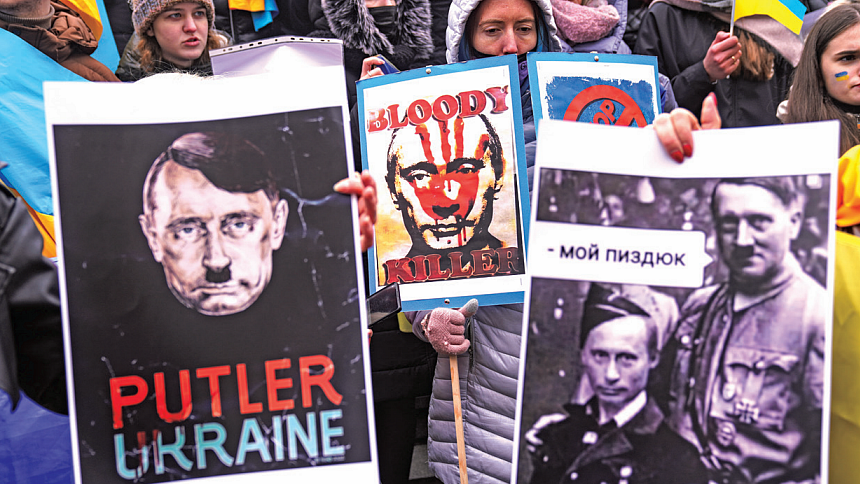Opinion
Putin’s self-destruction is a cautionary tale for other ‘strong’ leaders
The goodwill for Russia around the world was such that there were few takers for Western intelligence warnings that it was planning to invade Ukraine

In my lifetime, I’ve seen plenty of supposedly strong world leaders destroyed by hubris, but I’m struggling to recall when was the last time a leader at the height of his powers self-destructed himself the way Vladimir Putin has done with his ill-conceived military invasion of Ukraine.
In one inexplicably reckless stroke, he has alienated millions of his supporters, damaged the Russian cause, brought a deeply divided Europe together, and strengthened the shaky trans-Atlantic alliance. NATO, famously declared “brain-dead” by French President Emmanuel Macron, is suddenly up and running full tilt. Even the pacifist Germany has agreed to open its coffers citing Putin’s actions as a justification for strengthening European security.
“Far from dividing the West with fear, the unprovoked assault on Ukraine has been wholly counterproductive, uniting it in outrage. Spines are stiffening across Europe. Military volunteers are heading to Ukraine.... Aid is pouring in, including lethal weapons — not least from Germany, hitherto an inveterate military slacker... Hubris has squandered the fruits of decades of Russian divide-and-rule diplomacy,” wrote the respected British security expert Edward Lucas in The Times.
Putin had spent years trying to achieve exactly the opposite: to win new friends while consolidating existing alliances; keep intra-European tensions alive; and exploit fissures in trans-Atlantic relations to create instability in the region to serve Russian national interests. All these were legitimate political aims of a country seeking to regain legitimacy and influence after its humiliating collapse engineered by its Western rivals. He was right to be offended by their continued attempts to marginalise Russia through relentless expansion of NATO right up to its doors using its former territories such as Ukraine as proxies.
And the fact is that Putin’s pushback had started to yield results. On the back of some smart strategic moves, notably its intervention in Syria against the Islamic State when Western allies were floundering, Russia was rapidly coming out of the shadows, and for all the off-stage noises, had come to be accepted as a credible- if -wily power with which the West was willing to do business. Indeed, the West had shifted its focus to China as a real economic and security threat.
Published: undefined
The goodwill for Russia around the world was such that there were few takers for Western intelligence warnings that it was planning to invade Ukraine. Western leaders and the media were accused of creating hysteria. Even the Ukrainian President Volodymyr Zelensky was sufficiently upset to publicly appeal to them to calm down saying the talk of an imminent invasion was exaggerated and likely to inflame the situation.
Moreover, Moscow had already successfully made its point—namely that NATO’s continued eastward expansion was in flagrant breach of Western assurances that there would be no further incursions into Russia’s neighbourhood. A claim which Messers Joe Biden and Macron implicitly acknowledged while offering to discuss new security arrangements taking into account Russian concerns.
This was the point when Russia was widely expected to withdraw its troops and give diplomacy a chance. An expectation reinforced by Putin’s strenuous denials that he had no intenttion to invade Ukraine. So, what happened? Why did he decide to throw away everything he had so painstakingly built up over the years?
There is speculation that an invasion was always part of the plan but Putin was reined in by his more moderate advisers, notably the foreign minister Sergey Lavrov. Ultimately, however hardliners prevailed. Some have even questioned his mental state arguing that two years of self-imposed extreme isolation (for fear of catching Covid) that virtually cut him off from the real world might have affected his decision-making powers.
Of course, that’s nonsense. But there’s no doubt that his actions have more than a whiff of the moment-of-madness syndrome. Especially, as it appears, that he took the plunge without a Plan B to fall back on if the invasion didn’t go according to plan. And clearly it hasn’t.
Published: undefined
Inevitably, questions are being asked about Putin’s long-term future and whether he will be able to survive the crisis. His two main achievements were restoring political and economic stability to Russia after the post-Communism turmoil. Both are now threatened, and could spark a public backlash. He might then be tempted to rely on fear to survive. But as one British commentator pointed out fear is a “fragile foundation for ruling a vast, diverse, well-educated country”.
It doesn’t look good for Putin. Even if he survives for now, he is unlikely to retain the same authority. Which is bound to affect his ability to rule effectively. Meanwhile, his extraordinary rise and potentially imminent fall is a cautionary tale for all self-avowedly “strong” leaders consumed by a desire for a place in history.
(The writer is a London-based commentator)
(This was first published in National Herald on Sunday)
Published: undefined
Follow us on: Facebook, Twitter, Google News, Instagram
Join our official telegram channel (@nationalherald) and stay updated with the latest headlines
Published: undefined